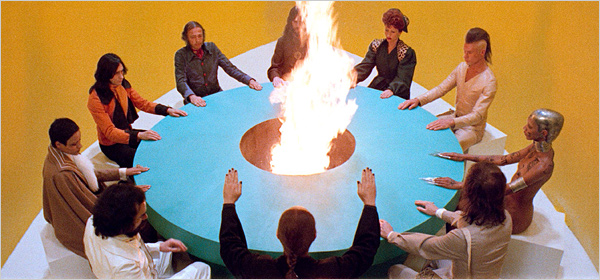The 1970 Western El Topo is probably Alejandro Jodorowsky’s best-known film, the familiar genre lending it an accessibility despite its whacked-out story and psychedelic imagery. But that movie’s follow-up, Holy Mountain, even more twisted and surreal, is easily the Chilean director’s best work. A savage and wantonly sacrilegious indictment of organized religion (among other things), Jodorowsky provides an almost nonstop series of insane visuals, contorting and distorting nearly every iconic religious image with his cracked fun-house mirror.
In a disgusting parallel to the Christ story, a thin, bearded figure known as the Thief (Horácio Salinas) is reincarnated after lying covered in flies and his own urine. Almost immediately a band of profiteers gets him soused, pours plaster on him and makes replicas of his form to sell to the masses. The Thief falls under the sway of the Alchemist (Jodorowsky), who impresses the reborn man by converting his feces into gold. The Alchemist then enlists the Thief in some sort of fuzzy plan to attain power and immortality. What happens as the film unfolds is so unique, so odd and so otherworldly it’s hard to describe. But there are naked blond twins who get their heads shaved bald, a frog-centric reenactment of Spain conquering Mexico and the so-called savior eating a replica of his own head that’s made of bread. And that doesn’t even begin to explain the parade of oddness. That it doesn’t all make sense hardly matters.
Jodorowsky uses his every visual gift he possesses to not only skewer religion but also consumerism, government and, ultimately, the medium of film itself. Jodorowsky wanted to blow up all false, misleading images, cinematic ones as much as religious ones, and encourage people to focus on reality instead of fantasy. But when he’s just spent two hours blowing minds and popping eyes, such lectures seem like false prophecy.•

